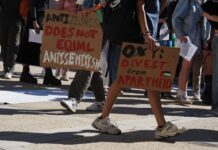Author: Melissa Rudberg
On Friday Oct. 10 educators from all over the country came to Oxy’s Branca Patio for the opening of The Algebra Project’s national meeting and planning session. The event was hosted by Oxy’s Center For Community Based Learning (CFCBL). The Algebra Project is a national non-profit organization created and headed by Robert Moses, an important figure in the civil rights movement, which seeks to provide all students with the quality of education that Moses thinks is necessary for full citizenship.
The organization is opening a new chapter in Los Angeles, beginning with Franklin High School in Highland Park. The event on Friday was just the start of a three-day planning session as well as the kick-off of the new branch of the Project. For the following two days, leaders and members of the organization analyzed teaching and community organizing methods and brainstormed on how they could be improved.
The Algebra Project recently received a grant from the National Science Foundation (NSF) to set up groups around the nation to test the effectiveness of the “cohort” method. This method sets up a cohort of 20-25 students who study algebra intensively for 90 minutes a day for all four years of high school following unconventional teaching methods that are specifically catered to students. A component of this method is using games that teach algebra in a fun way.
Students who have completed the program have gone on to universities that enable them to work in jobs they may have otherwise not been able to, as these students come from underprivileged backgrounds. The program helps them do what Moses describes as, “jumping through the state, national and university hoops.”
Moses was the first to speak at the event. He described the deep roots of the Project. Before it began, Moses was working in Mississippi in the ’60s to register sharecroppers to vote. During the Civil Rights era, he said, “registering poor African-Americans to vote was an organizing tool to achieve the goals of democracy.” After the Civil Rights era, Moses attained a doctorate in mathematics from Harvard.
Greg Rowe, who works with the Algebra Project in Miami and knows Moses well, said, “When his daughter, who attended an all-black school, was doing poorly in math, he knew that he had to do something about education.” Moses thought he could use something similar to voting registration in the Civil Rights Era as an organizing tool. Now, Moses said, “using information technology [math] as an organizing tool to lift students from the lowest tiers of the educational system to the top could help accomplish the goal of actual democracy.”
The next speaker, Ernesto Cortez, Jr. from the Industrial Areas Foundation, a Chicago-based community organizing network, provided more insight on the motivations driving the Project. “Educators must get into the perspective of younger people in order to educate them better,” he said. Cortez was critical of what he sees as a public education system that focuses on passing standardized tests. “Teachers whose focus is to teach students how to take tests makes teachers hate teaching, and students learning how to take tests makes students hate school,” he said.
The new branch of the Algebra Project in L.A. is just one of several emerging across the country. Despite starting small with 25 students in each school, this movement aspires to become a large educational movement at par with the Civil Rights Movement.
“Educational rights are important, empowering,” because “education has a civic mindedness notion embedded in it,” Cortez said. Thus, he said, “public schools are necessary for the development of civic and democratic culture.”
This article has been archived, for more requests please contact us via the support system.
![]()





































